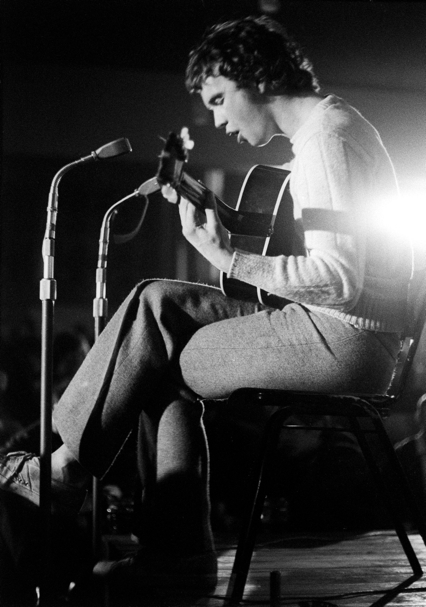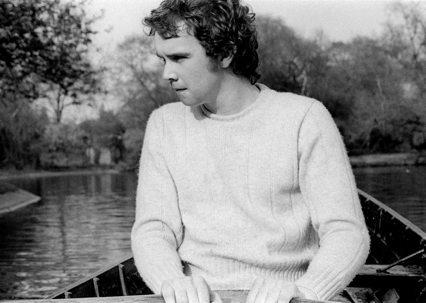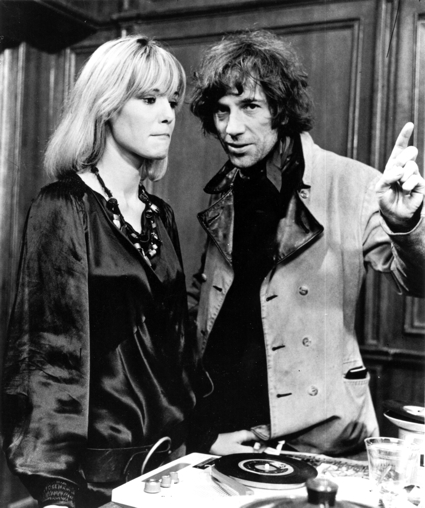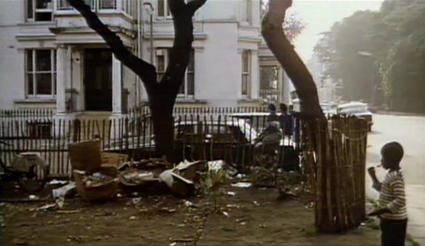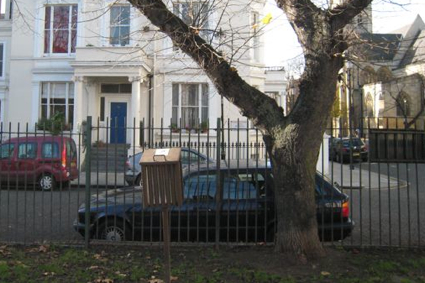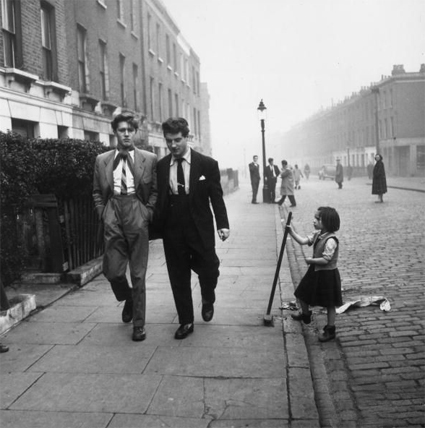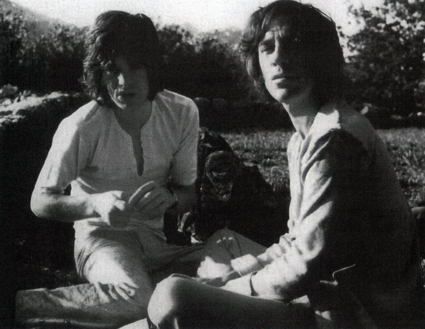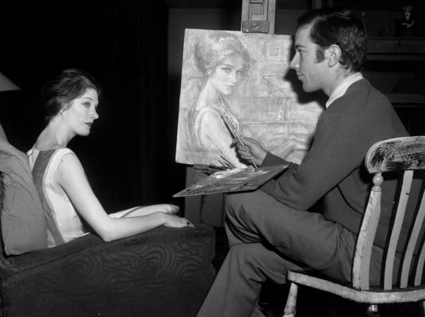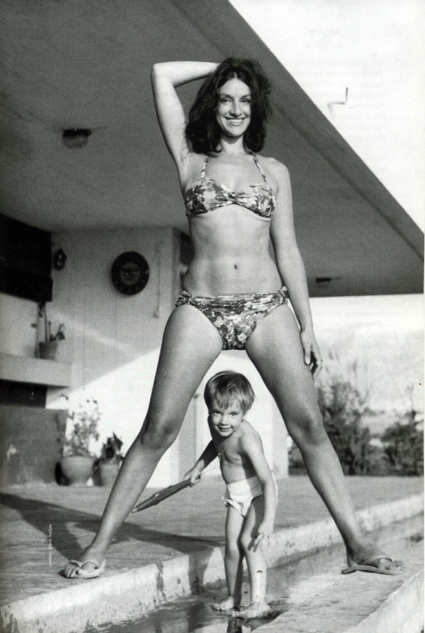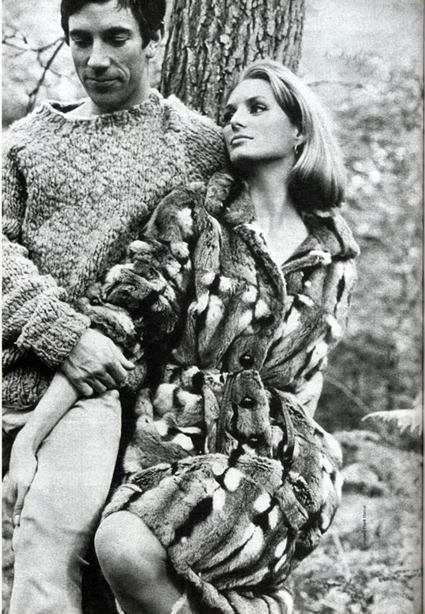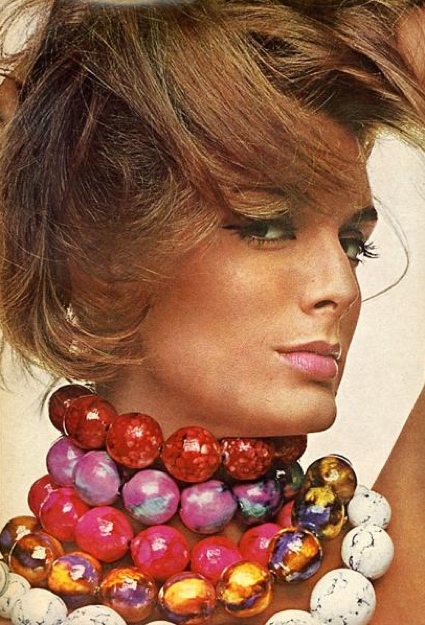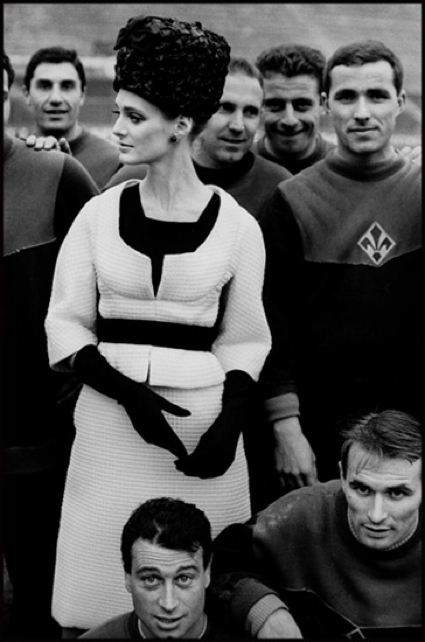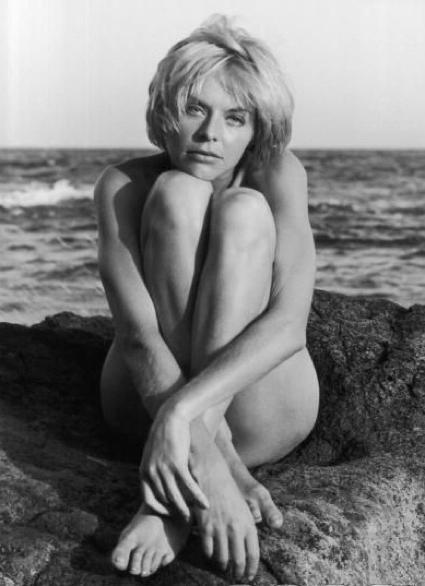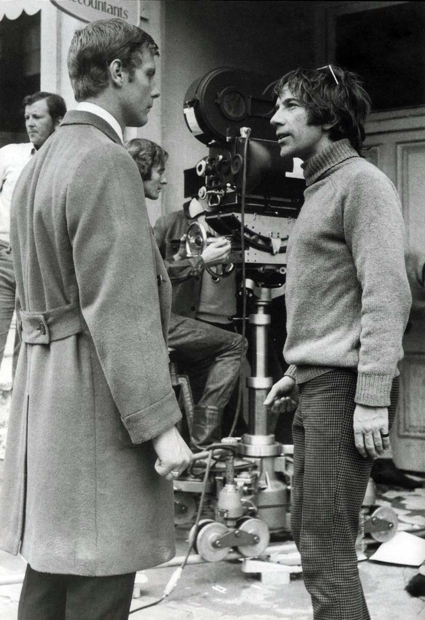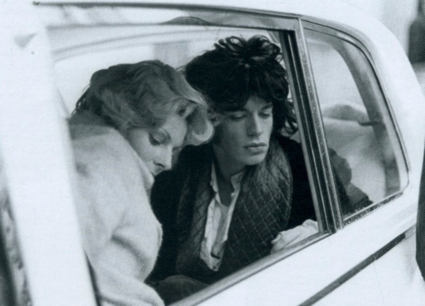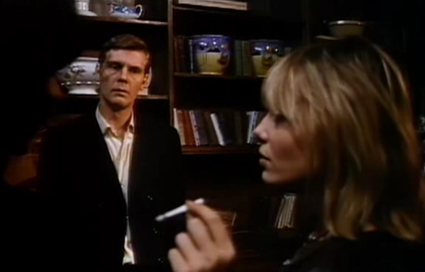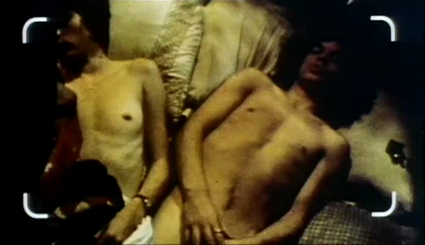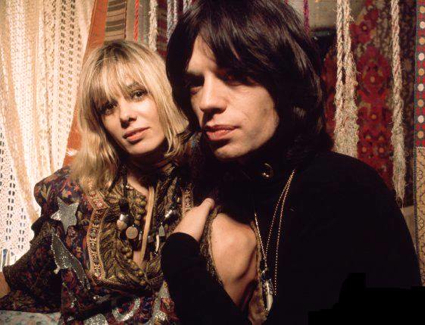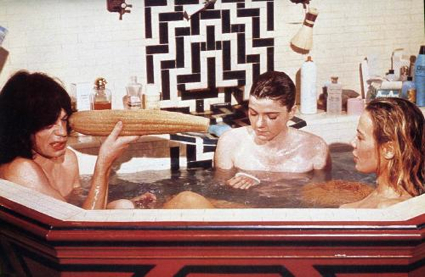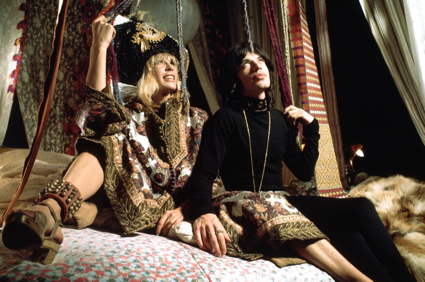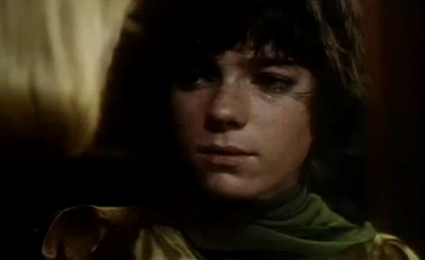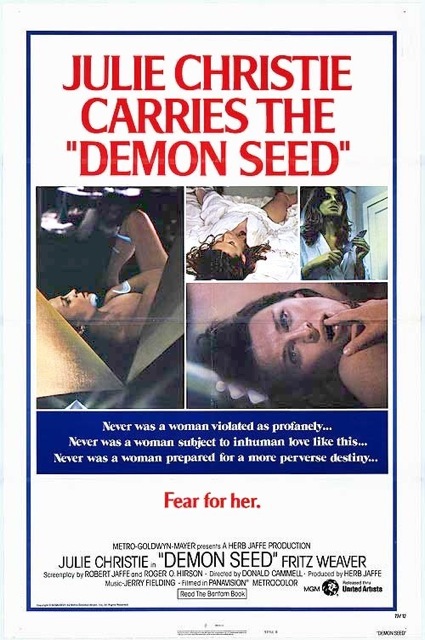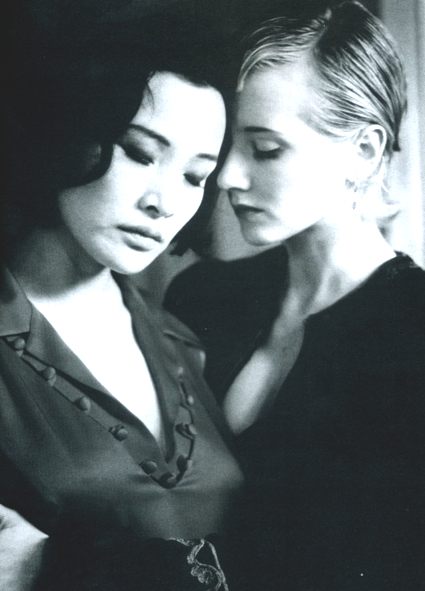John Martyn is pretty close to my favourite singer/songwriter. Only sixty, but I suppose he did party a lot. RIP.
Archive for January, 2009
John Martyn 1948 – 2009
Thursday, January 29th, 2009Donald Cammell’s Performance at Powis Square
Wednesday, January 7th, 2009“Kick-starting the day with a five-skinner and a bath with two naked girls has never seemed so domestically routine.” – Mick Brown
Donald Cammell’s film Performance, shot in the summer of 1968, was largely set in a large house in Notting Hill’s Powis Square. This was a part of Notting Hill, featuring large run-down peeling terraces and squares that, a decade earlier, Colin MacInnes in his London novel Absolute Beginners had called ‘Napoli’. It was also, at that time, that is the mid to late fifties, the main stomping ground of the notorious and disreputable landlord Peter Rachman.
The original white working class neighbourhood was having to uneasily mix with a burgeoning West Indian immigrant community which was increasing in size not least because Rachman was willing to house West Indians – albeit at his infamous price. Powis square was where Rachman bought his first major London property – a huge Victorian building – which he had subdivided to such a degree that approximately 1200 tenants eventually lived there.
By 1968 the down-at-heel ambience of the area had also attracted a further wave of inhabitants – hippies, who hung around the Portobello Road market and the nearby ‘head’ shops. In other words it was the perfect bohemian part of London in which Performance’s fictitious rock star Turner lived. Turner, of course, was played by Mick Jagger and the film, along with Nicholas Roeg, was directed by the rather dissolute and louche friend of the Rolling Stones Donald Cammell.
Cammell was born on 17th January 1934 in the Outlook Tower by the side of Edinburgh Castle to rather bohemian parents – his father, after losing the family fortune in the thirties (his family was part of the Cammell-Laird shipbuilding firm), was an editor of Art magazines. They must have encouraged the artistic side of his nature because by the age of 8 he was exhibiting at the Royal Drawing Society and won a scholarship to the Royal Academy at the age of 16. Good looking, gifted and self-assured, Cammell became a sought after society portrait painter before he was 20. He owned a studio in Chelsea’s Flood Street and was already enjoying a hectic party-lifestyle which in effect continued for two or three more decades.
In 1954 he had married the Greek actress Maria Andipa and in 1959 they had a son Amadis. A few months previously he and Maria had moved from Chelsea to Hampstead, apparently to be close to the actress Jill Ireland who was living there at the time and with whom Cammell was having an affair. One day soon after the move Maria returned from the doctor with what she thought was happy news that she was having a baby. Cammell completely crushed Maria by saying “I love you, and want to share my life with you, but I don’t want to share it with a child.” True to his word he left almost immediately for New York and cruelly would only see his son twice during the rest of his life.
It was in New York where Cammell met and lived with the model Deborah Dixon – he was to be with her for ten years and their relationship finished just before the filming of Performance, although she was a costume designer on the film. He had by now rejected painting society portraits and was now concentrating on work that had a Balthusian lolita-inspired influence (ie lots of young naked girls). While this helped him sate his notable sexual appetite (for much of his life he was irresistible to a good deal of the female sex and Dixon was seemingly happy with this and often shared his conquests) his artistic desires, at least in the form of painting, were waning.
He moved to Paris with Deborah where she continued to model and where he began to try his hand at writing screenplays. She was now a very successful international model and essentially Cammell lived off her money for some years. During this time he collaborated on a script which was eventually made into a bad thriller called The Touchables and subsequently another script which was turned into a very sixties caper movie in 1968 called Duffy (originally called Avec Avec) which starred Susannah York, James Fox and James Coburn. Although Duffy was a better film than The Touchables it was still very flawed and again unsuccessful at the box office and this encouraged Cammell to try and direct the next film himself.
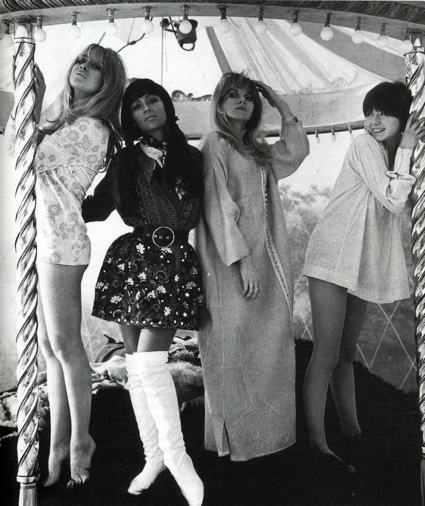
Monika Ringwald, Esther Anderson, Judy Huxtable and Kathy Simmonds – on the film poster it said ‘they try anything’.
Filming started on Performance in July 1968, a few weeks after the death of Cammell’s father, and the production was later called by Marianne Faithful a ‘psycho-sexual lab’ and ‘a seething cauldron of diabolical ingredients: drugs, incestuous sexual relationships, role reversals, art and life all whipped together into a bitch’s brew’.
The old Harrovian and ex-Coldstream Guard officer James Fox was chosen to play Chas – a professional criminal on the run from his gangland boss Harry Flowers. Fox had recently grown his hair and become a bit of a hippy and had also become a close friend of Mick Jagger’s (for a short while Fox, Jagger, Faithfull and Fox’s partner Andee Cohen were essentially living a menage a quatre and Cammell later even hinted that Fox and Jagger had been lovers). Looking for a hiding place Chas finds himself at the dilapidated Powis Square house of the fading rock star Turner (played by Jagger). Chas announces soon after his arrival – “What a freak show! Druggies, beatniks, free love… a right piss-hole.” Living in the house with Turner were his two girlfriends Pherber, played by Anita Pallenberg then Keith Richards’ girlfriend, and Lucy, played by the 16 year old French waif Michele Breton.
After some sexually-ambiguous explorations with Turner, Pherber and Lucy in addition to a particularly huge mushroom trip Fox/Chas starts to feel more comfortable with staying at the rambling Powis Square house eventually undergoing a personality change and a metamorphis into the Jagger/Turner character. At the beginning of the film Chas says ‘I know who I am!’ by the end of the movie it’s certain that he doesn’t.
Cammell managed within the film, and to the chagrin of Pallenberg who realised what he was doing, to recreate a menage a trois that had existed between himself, Deborah Dixon and Michele Breton the preceding year. The trio were often seen together in Paris in 1967 but Cammell and Dixon had initially met Breton on the beach in St Tropez in 1966 when she must have been 14 or just 15. Sandy Lieberson, the producer of Performance, described Breton as ‘someone who didn’t care who she slept with. A strange little creature, totally androgynous-looking – the way Donald liked them.’ ‘Everybody was sleeping with everybody’, Breton later remembered, ‘it was those times’.
Indeed the production became infamous for its sex on and off the camera – one person working on the production described it as ‘the most sexually charged film ever. Everyone was fucking everyone. And Donald was a class-A voyeur.’ To confuse everything Pallenberg had also been a former lover of Cammell’s and during the filming of Performance she admitted that she, Jagger and Breton had actually consummated the threesome sex scene in the film. The more graphic footage of which found its way to an erotic film festival in Amsterdam a few years later apparently winning a prize. Keith Richards who never appeared on set but through mutual acquaintances knew something was going on between his girlfriend and his best friend and was often seen during the production fuming in his Rolls-Royce outside or the in the pub down the road. Overlooking all this one imagines a joyous Donald Cammell rubbing his hands in glee.
Cammell was not particularly partial to drugs, although he smoked hash occasionally and had tried the odd LSD trip, but perhaps Performance was the first film that portrayed drug-taking that was also made by people who took drugs as a normal lifestyle choice. The drug-taking that went on during the filming of Performance was legendary. The art director John Clark said ‘you took one breath and you were stoned’ and a crew member on the production said ‘you want to get a fucking joint, they’re coming out of your earholes. You want a cup of tea, you’ve got no fuckin’ chance!’
Cocaine, yet to be the rock star’s drug of choice, wasn’t mentioned within the film but the characters all smoked hashish, took mushrooms (when Chas first arrives at Powis Square there is a shot of the mushrooms growing in a tray by the front door along with a couple of mars bars wittily referring to the Redlands’ drug bust the year before) and we also see heroin being injected, as a ‘vitamin shot’, by Anita Pallenberg.
Turner tells Chas at one point in the film “The only performance that makes it… that makes it all the way, is the one that achieves madness.” And the drugs and the psychotic atmosphere on the set seemingly took its toll on the main performers. A year after the completion of filming James Fox, while performing in Doctor in the House in Blackpool was persuaded to join a religious movement called the Navigators and left acting for ten years to become a Christian evangelist.
Anita Pallenberg started taking heroin seriously during the filming and subsequently became heavily addicted to the drug. She said ‘I think Performance was the end of the beautiful sixties – love and all that. That film marked the end for me.’ She continued to be a heavy user of heroin for ten years and eventually split from Richards at the end of the seventies.
Not a lot was known about Michele Breton especially after the film had finished. Cammell later said that she had smoked too much hash and was frequently under the influence of psychedelics. Breton herself said in 1995 ‘I was taking everything that was going. I was in a very bad shape, all fucked up.’ Soon after the completion of the movie Cammell eventually drove her to Paris letting her stay at his flat for a couple of days he then told her that he didn’t want to see her again.
Mick Jagger, perhaps alone amongst the main protagonists, came out of the experience mentally intact. According to Marianne Faithful, who helped him gain enough courage to act in the film, ‘Mick came out of it splendidly…he didn’t have a drug problem and he didn’t have a nervous breakdown.’ It could be said that the Turner became the character that Jagger used to present himself to the world – androgynous, decadent and sinister.
Donald Cammell’s subsequent directing career after Performance never really took off. The major film studios avoided him from the first screening of the film which couldn’t have gone more badly. One Warner studio executive wife literally vomited on her husband’s shoes while another executive after watching the film said ‘Even the bathwater’s dirty.’ The film was only released, almost two years after its completion, in 1970.
Cammell completed just three films in the next 25 years, Demon Seed with Julie Christie in 1975, White of the Eye in 1987 and Wild Side in 1995. The studio behind his last film refused to release Cammell’s version and released an exploitative cut to Cable TV.
A year later Cammell, after a life time suffering from bouts of depression, committed suicide by shooting himself in the head. The myth is that Cammell aimed his bullet in such a way that he would be able to experience for several minutes what it was like to die. However according to the coroner he died pretty well instantly.
Keith Richards, who never forgave Cammell for letting Pallenberg and Jagger fuck on camera, once said of Performance ‘The best work Cammell ever did, except for shooting himself’.
Mick Jagger – Memo From Turner
DVD of Performance can be bought here and the soundtrack of the film from here.
